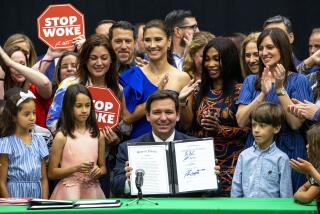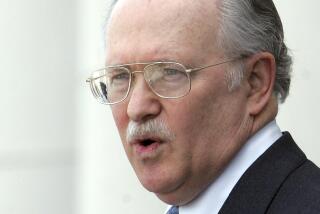Tax laws and religious speech: what the Constitution says
Today’s question: Does the Constitution have anything to say about the relationship between federal tax law and political speech by clergy? Previously, Stanley and Lynn discussed how far ministers can delve into politics without inviting federal scrutiny, whether churches should receive tax exemptions at all and if federal tax law muzzles free speech from the pulpit.
1st Amendment trumps the Johnson Amendment
Point: Erik Stanley
What the Constitution says about the interplay between tax law and a pastor’s speech form the pulpit isn’t surprising. Essentially, the 1st Amendment trumps the Johnson Amendment, the law that prohibits tax-exempt churches from endorsing or opposing candidates.
When Congress added then-Sen. Lyndon Johnson’s amendment to the tax code in 1954, it did so with no attempt to accommodate the constitutional rights of pastors. The legislative history of the Johnson Amendment illuminates the fact that it was simply a political power play designed to silence opponents of Johnson’s reelection as a senator.
Barry, if you agree that the government has the right to monitor and censor a pastor’s sermon from the pulpit, you have to be able to square that with the Constitution. And, Barry, I have yet to hear from you any substantive legal reason why the government is allowed to trample the constitutional right of pastors to speak freely from the pulpit. So let’s cut through the political haze and the hyperbole you frequently employ and look at the cold, hard facts of how the Johnson Amendment measures up to the 1st Amendment.
For starters, the Johnson Amendment perpetuates a system that requires government agents to monitor and parse the words of a pastor’s sermon to determine whether that sermon violates the law and punishment should be meted out. That system is an excessive and unreasonable government entanglement with religion. Your attempt to argue that the Johnson Amendment does not violate the “separation of church and state” issue you so frequently trumpet continues to defy reality. There is a healthy separation of church and state, and the Johnson Amendment violates it. Regardless of all the rhetoric about this issue, it really does come down to something that simple.
The Johnson Amendment allows the government to determine when a pastor’s speech becomes too “political.” That is an absurdly ridiculous standard. A pastor’s speech from the pulpit that talks about candidates from a scriptural point of view is religious speech. That speech doesn’t become political any more than a pastor’s speech becomes commercial when he gives a Scripture-based assessment of the current financial debacle on Wall Street. Allowing government agents to make that determination is as absurd as asking a first-grader to design and build NASA’s next space shuttle.
The Johnson Amendment also allows the government to parse the content of a pastor’s sermon to determine whether it violates the law. That is called a content-based restriction on speech, which the 1st Amendment’s free-speech clause prohibits unless the government has a compelling reason for censorship. And, Barry, you’d have to ignore reality to agree that there was any compelling reason for Johnson’s amendment.
Finally, the Johnson Amendment violates the 1st Amendment’s free-exercise clause. A pastor is allowed to be a pastor and apply Scripture to every area of life except for candidates and elections. For those pastors who believe the Bible has a lot to say about those issues, the Johnson Amendment burdens their free exercise of religion. Government cannot burden religion in this way without a compelling reason -- which, again, is nonexistent.
Barry, this is the constitutional reality facing the Johnson Amendment. A basic understanding of that reality demonstrates easily that the 1st Amendment trumps the Johnson Amendment.
Erik Stanley is senior legal counsel and head of the Pulpit Initiative for the Alliance Defense Fund, a legal alliance of Christian attorneys and like-minded organizations defending the right of people to freely live out their faith.
Stop encouraging ministers to violate federal law
Counterpoint: Barry W. Lynn
Good grief, Erik, I would never be given to hyperbole. In fact, it is you and the Alliance Defense Fund that appear to believe that the Johnson Amendment is just one hair’s breadth away from destroying “pulpit freedom” in America. Nonsense. This prohibition against candidate endorsement (which I remind you is shared by all secular nonprofits as well) certainly didn’t silence the late Dr. Jerry Falwell (on the right) or the Rev. William Sloane Coffin (on the left) during the Vietnam War. It has not stifled contemporary voices like Bishop Harry Jackson (on the right) or the Rev. Jeremiah A. Wright Jr. (on the left). We have a dazzling amount of freedom to express the most controversial viewpoints imaginable from American pulpits. We just can’t have sermons converted into political advertisements for candidates.
Also, there is very little “parsing” of sermons done by the Internal Revenue Service (with the exception of one case involving an Episcopal church in Pasadena, where I think the IRS initially made an erroneous conclusion about an endorsement after reading a sermon). Most of what the IRS investigates are the kind of egregious examples of electioneering that we sometimes report to them. Is it “free exercise” of religion to spend church collection plate money on an ad telling people not to vote for Bill Clinton? (Most people would say of course not. In this case, two federal courts also said of course not.) How about a pastor telling people to vote for Al Gore when he was running against Bill Bradley in the 2000 Democratic presidential primary in New York? (That minister got a visit by the IRS and admitted he had done the wrong thing.)
By the way, the Johnson Amendment doesn’t bar “political” statements; it prohibits declarations “in support of or in opposition to candidates for public office.” In most instances, that first-grader you mention who can’t build the space shuttle could tell that the pastor wanted one person elected over another in the complaints we file. It is obvious what the pastor is trying to do, and there is nothing vague about it.
Your complaint is really not that the law is vague; it is that it exists at all. There certainly is a “compelling reason” to prohibit tax-exempt religious groups from partisan politicking. We are trying to clean up the way campaigns are financed, not make them less transparent. Opening up the opportunity for powerful local pastors or even nationally know television preachers to utilize ministry resources for campaigning would be letting that whole camel you mentioned the other day into the tent and feeding him breakfast.
Your group is making a big mistake in urging pastors to violate federal tax law in their sermons this Sunday. Some months ago, you were proclaiming that dozens of church leaders would be challenging the law and that you’d even let the press know which ones would be taking this “bold” move. Now it appears that no such list is going to be produced. If pastors or you are getting cold feet, it is not too late to just call off the dance.
The Rev. Barry W. Lynn is executive director of Americans United for Separation of Church and State. He is an ordained minister in the United Church of Christ and a longtime civil liberties attorney.
More to Read
A cure for the common opinion
Get thought-provoking perspectives with our weekly newsletter.
You may occasionally receive promotional content from the Los Angeles Times.






